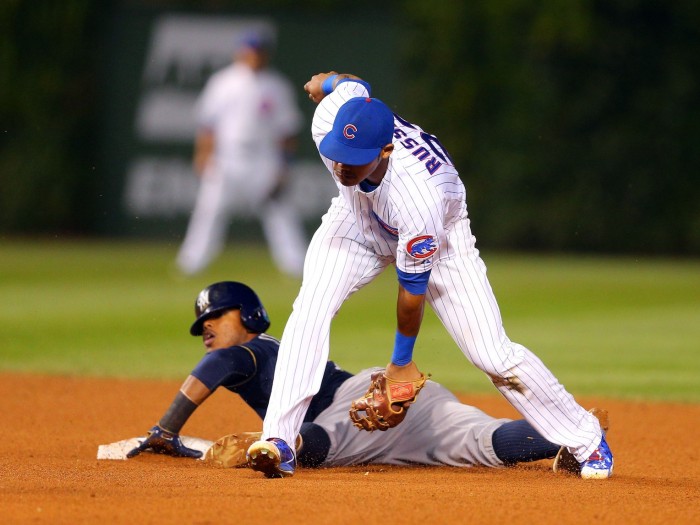The Brewers, as a team, have their fair share of speedsters. Sure, Carlos Gomez has departed to so-called greener pastures [sobs], but Ryan Braun can still hold his own on the basepaths, as can Jean Segura. Plus, Orlando Arcia and Brett Phillips — who stole 25 and 18 bases, respectively, in 2015 — will arrive at the Major League level soon enough. When they do, and assuming Craig Counsell remains the club’s manager, it will be interesting to see how he deploys them.
Ron Roenicke came to Milwaukee after the 2010 season with a distinct philosophy in mind. As Christina Kahrl wrote in 2011:
Roenicke came into the job saying he was going to import the Angels way of taking extra bases and pushing opposing defenses, not to change the Brewers’ winning-slugly ways but to augment them. What had been a station-to-station offense under his predecessor, Ken Macha, would have to do more than that to win on his watch. “I want us to be aggressive running the bases, and we will emphasize this with the Brewers,” Roenicke said. “I think being aggressive gives the players more confidence, and it also wears on the opposition.”
This sort of mindset began to manifest itself in the team’s stolen base numbers. After a 2011 season that saw the Brewers rank 21st in baseball with 94 stolen bases, they would lead the majors with 158 in 2012 and place third with 142 in 2013. But that approach came with a cost: more outs made. Across those respective three years, Milwaukee went from 26th to 15th to second in caught stealings, accruing a respective 31, 39, and 50. Thus, while the Brew Crew’s 9.4 stolen base runs topped the world during the middle season, they accumulated a more modest 1.4 and 4.3 runs in the years sandwiching it.
As if those campaigns didn’t demonstrate the volatility to this model, the 2014 campaign showed how it could severely backfire. In that year, the Brewers paired the eleventh-most stolen bases in the majors (102) with the sixth-most failed attempts (43); that combination caused them to drop to 17th in stolen-base runs, with -0.9. Some of that came from the personnel — an injured Braun and an awful Gerardo Parra, to name a few contributors — but it ultimately fell on the team’s strategy. Even as the club plummeted from contention, Roenicke stuck by his guns.
In the offseason, it appeared that things could change. Roenicke told Tom Haudricourt that, although the team would still play aggressively, they were “running into too many outs” and would have to exercise more discretion going forward. The Brewers’ skipper, of course, only received 25 more games to put that plan into action, and those contests didn’t show much improvement: Milwaukee swiped eight bags in 14 tries, losing 1.1 runs in the process. Those deficiencies helped drag the team to a 7-18 record, which cost Roenicke his job.
But enough about the old guy. Counsell manages this team now, and his squad had some base-stealing success in his debut. Across the final 137 games of the season, the Brewers stole 76 bases while coming up short just 23 times; that earned them 3.9 runs. Extrapolating that over the full 162 games of a season, you get 4.6 runs, a mark that would have tied the Royals for fourth-most in baseball.
Of course, one season of prosperity doesn’t mean a whole lot — after all, Roenicke’s team fared well in 2012, and that didn’t last. The difference lies in their policy. As you may have guessed, Counsell doesn’t share the brash tendencies of his predecessor:
| Manager | G | SBA | SBA/162 | SBC | SBC/162 | SBA/C |
|---|---|---|---|---|---|---|
| Roenicke | 673 | 673 | 1.0 | 5590 | 8.3 | 12.0% |
| Counsell | 137 | 99 | 0.7 | 1171 | 8.5 | 8.5% |
[Stolen base chances defined as H + uBB + HBP, in accordance with wSB.]
Not only did the Brewers take off less often under Counsell, they did so given more opportunities. Whereas Roenicke would give them one green light per game, Counsell held up more often, and it seemed to work in his favor.
It is worth noting that, as he had promised, Roenicke became more passive in his final month-plus. The team’s 14 tries over 25 games and 172 chances represented a significant decrease from the levels of prior years. Nevertheless, Roenicke viewed the art of base stealing very differently than Counsell does, which — for the latter — is likely a good thing. As more players with fleet feet join the Brewers in 2016 and the years beyond it, perhaps a more cautious approach will allow them to excel in this regard. And as a small-market club with long-term aspirations that are rather lofty, every little advantage will be crucial.
